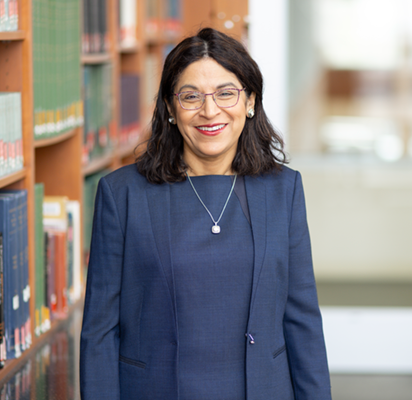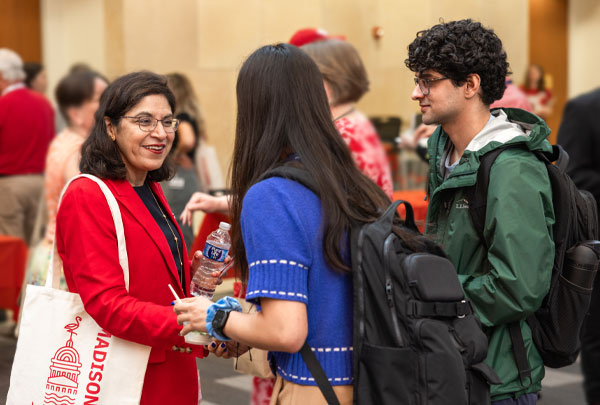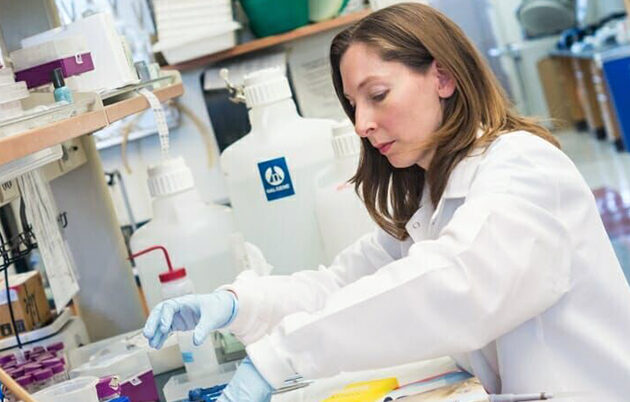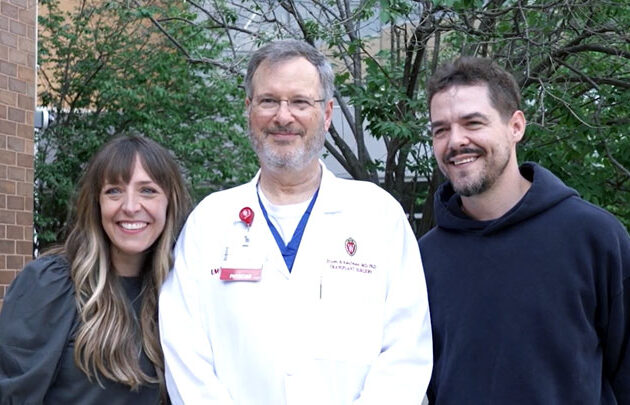A renowned surgeon-scientist, she has held top roles at some of the nation’s leading institutions in academic medicine and was most recently the chair of the Department of Surgery at Yale School of Medicine. SMPH faculty, staff, and students participated in a Wisco Welcome event in June to introduce Ahuja to many Badger traditions. Here, she shares her first impressions of UW–Madison (“so much energy!”), her immediate priorities (listening is number one), gratitude for Dean Golden’s legacy of leadership, thoughts on leading with optimism amid evolving national and global conditions, and more.
What are you most excited about as you step into your new role?
The energy of this university is remarkable! Walking around the Health Sciences Learning Center — well, hobbling as I recover from a sprained ankle — I can feel that energy. I have been impressed by the people here, how kind and generous and grounded they are. When I watched J.J. Watt’s 2019 UW–Madison commencement speech on YouTube, I really connected with these ideas: We work hard; we are determined; we aim for excellence. We are not arrogant, but we get it done.
From breakthroughs in cancer research and therapy, to the synthesis of an anticoagulant derived from an analog of coumarin — which became marketed as warfarin — to the discovery of reverse transcriptase that led to a shared Nobel Prize for Howard Temin, PhD, UW–Madison has a storied history of exploration. And discovery is still happening every day: I just came back from a packed theranostics symposium! We are truly a vibrant campus.
You have described listening as an immediate priority. What are others?
Getting to know the school community is a big priority. I want to hear about the successes and the things we don’t do well. As dean, I consider it my job to serve all faculty members, students, and staff, so I will be asking how we can do that best. I have two roles: dean of the school and vice chancellor for medical affairs at UW–Madison, and that means thinking about how we can connect and intersect with other health sciences units and schools. Expanding a vision for the west side of campus — which is home to the UW Schools of Nursing, Pharmacy, and Veterinary Medicine, as well as UW Health — includes thinking not only about our buildings, but about how we connect to each other and to our patients.
I would like for us to be a beacon for the Wisconsin Idea. That means healthy communities and healthy longevity. As the nation’s first combined school of medicine and public health, we think about health, not just disease. That thinking goes along with biomedical innovation, it stems from humanism, and it emerges from thinking about all aspects of longevity. I would like for us to continue setting that as an example here in Madison, as well as at the state, regional and national levels. Under the skillful and storied legacy of Dean Golden we have already been engaged in this work, and I would like us to envision how we can do it bigger and better together. We anticipate bringing our partners — grateful patients and donors, elected officials and policymakers, industry partners, and others — into the conversation to get to that next stage.
How has your leadership style been shaped by your core values?
I have been described as a visionary, as someone who scans the horizon and builds with a sense of pragmatism, thinking about “How do we deliver?” I believe in empowering leaders to their full potential. I cannot do it all, and I ask that my leaders educate me. We discuss, we decide, and we unite in one vision. My core values include excellence, integrity, collaboration, respect, and — very important — performance. I always want to create a sense of belonging. That has to be there! Those values J.J. Watt mentioned as part of the Badger Way — hard work and humility — also resonate with me.
Amid the challenges facing academic medicine, do you see opportunity for optimism?
Yes. I have observed the decline of public trust in science over the last few years, and I think it says we have not talked with and listened to our communities enough. We must reflect first on what did not go well and then talk about what we can do better. When we talk about health, it is important to use language that helps people understand the research and the decisions and choices that care providers make. Call me a Pollyanna, but I believe the pendulum will swing back to belief in science. We have work to do in our communities — with teachers, community leaders, parents, and legislators. Good work is never easy, but I do see opportunities, especially with partnerships rather than academic medicine doing it alone.



